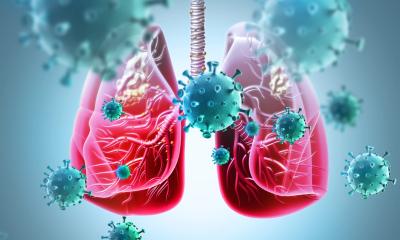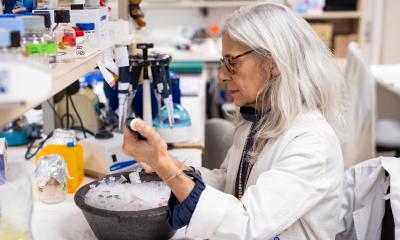Image source: Unsplash/Artur Kornakov
News • Infection research
Researchers pinpoint Covid-19's most contagious phase
Each wave of the pandemic has underscored just how gravely contagious Covid-19 is, but there is less clarity among experts on exactly when—and to what extent—infected individuals are most likely to spread the virus.
Now, a new study co-led by a Boston University School of Public Health researcher has found that individuals infected with the virus are most contagious two days before, and three days after, they develop symptoms. Published in the journal JAMA Internal Medicine, the study also found that infected individuals were more likely to be asymptomatic if they contracted the virus from a primary case (the first infected person in an outbreak) who was also asymptomatic. “In previous studies, viral load has been used as an indirect measure of transmission,” says Leonardo Martinez, assistant professor of epidemiology, and who co-led the study with Yang Ge, research assistant in the Department of Epidemiology & Biostatistics at the University of Georgia College of Public Health. “We wanted to see if results from these past studies, which show that that Covid cases are most transmissible a few days before and after symptom onset, could be confirmed by looking at secondary cases among close contacts.”
This understanding provides further evidence that rapid testing and quarantine after someone is feeling sick is a critical step to control the epidemic
Leonardo Martinez
Martinez and colleagues conducted contact tracing and studied Covid-19 transmission among approximately 9,000 close contacts of primary cases in the Zhejiang province of China from January 2020 to August 2020. “Close” contacts included household contacts (defined as individuals who lived in the same household or who dined together), co-workers, people in hospital settings, and riders in shared vehicles. The researchers monitored infected individuals for at least 90 days after their initial positive Covid test results to distinguish between asymptomatic and pre-symptomatic cases.
Of the individuals identified as primary cases, 89 percent developed mild or moderate symptoms, and only 11 percent were asymptomatic—and no one developed severe symptoms. Household members of primary cases, as well as people who were exposed to primary cases multiple times or for longer durations of time, had higher infection rates than other close contacts. But regardless of these risk factors, close contacts were more likely to contract Covid-19 from the primary infected individual if they were exposed shortly before or after the individual developed noticeable symptoms. “Our results suggest that the timing of exposure relative to primary-case symptoms is important for transmission, and this understanding provides further evidence that rapid testing and quarantine after someone is feeling sick is a critical step to control the epidemic,” Martinez says.
In comparison to mild and moderate symptomatic individuals, asymptomatic primary individuals were much less likely to transmit Covid to close contacts—but if they did, the contacts were also less likely to experience noticeable symptoms. “This study further emphasizes the need for vaccination, which reduces clinical severity among people that develop Covid,” says Martinez.
Source: Boston University
26.08.2021





